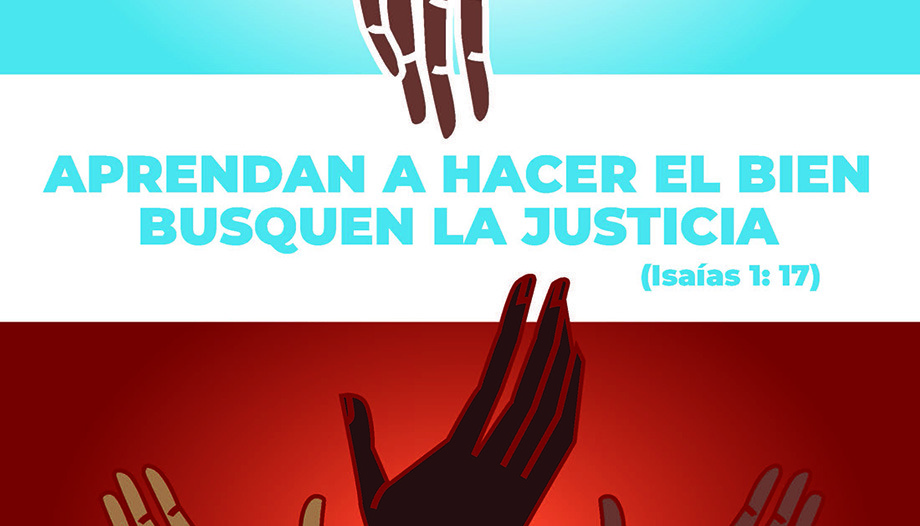









The theme was chosen by a local group in the United States convened by the Minnesota Council of Churches. It is an invocation taken from the Book of the Prophet Isaiah (1:17): "Learn to do good, seek justice". It is the theme that serves as the backdrop for the Week of Prayer for Christian Unity.
The International Commission jointly appointed by the Pontifical Council for Promoting Christian Unity, now a Dicastery, and the Faith and Order Commission of the World Council of Churches, and charged with reviewing the Week's grant, met with delegates from the Minnesota Council of Churches in Bossey, Switzerland, September 19-23, 2021.
The local group that wrote the grant was made up of men, women, mothers, fathers, all people who could tell their stories and heal their wounds. Representatives of different worship experiences and spiritual expressions, both from the indigenous peoples of the United States and from the immigrant communities - forced or voluntary - who now call this region home, and who show - as Alessandro Di Bussolo writes today in Vatican News - an amazing ability to tell and heal their own stories.
The Minnesota group also included immigrants and victims of racism. The members of the group were also an expression of urban and suburban regions and numerous Christian communities. This fostered deep reflection and an experience of solidarity enriched by multiple perspectives. From the members of the local Minnesota group, the desire that their personal experience of being victims of racism as human beings could serve as a witness to the wickedness of those who do not hesitate to offend and denigrate their neighbors. Along with the desire that Christians, thanks to the divine gift of unity, overcome the divisions that prevent them from understanding and experiencing the truth that we all belong to Christ.
During the Week of Prayer, Pope Francis, after this morning's general audience, will celebrate Mass on January 22, Word of God Sunday, at 9:30 a.m. in St. Peter's Basilica. Three days later, on January 25, in the Basilica of St. Paul Outside the Walls at 5:30 p.m., the Pope will celebrate Second Vespers to close the Week of Prayer for Christian Unity on the Solemnity of the Conversion of the Apostle Paul.
A few historical notes may help to better understand the spirit and content of the Week: an ecumenical initiative of prayer in which all Christian confessions pray together for the attainment of the full unity that is the will of Christ himself. Traditionally, it is celebrated from January 18-25, because it falls between the Feast of the Chair of St. Peter and the Feast of the Conversion of St. Paul. The Episcopalian Reverend Paul Wattson officially initiated it in Graymoor (New York) in 1908 under the name Octave for the Unity of the Church, in the hope that it would become a common practice.
This initiative arose in Protestant circles in 1908; since 1968, the theme and texts of the prayer have been elaborated jointly by the Faith and Order Commission of the Ecumenical Council of Churches, for Protestants and Orthodox, and by the Pontifical Council for Promoting Christian Unity, for Catholics (predecessor of the current Dicastery).
As has been said, the first hypothesis of a prayer for the unity of the Churches arose in the Protestant sphere at the end of the 18th century; and in the second half of the 19th century a Union of prayer for unity began to spread, supported both by the first Assembly of Anglican bishops at Lambeth (1867) and by Pope Leo XIII (1894), who invited it to be included in the context of the feast of Pentecost. Later, at the beginning of the 20th century, the Ecumenical Patriarch of Constantinople Joachim III wrote the patriarchal and synodal encyclical Lettera irenica (1902), in which he called for prayer for the union of believers in Christ. It was finally the Rev. Paul Wattson who proposed the celebration of the Octave for the first time in Graymoor (New York), from January 18 to 25.
In 1926, the Faith and Order movement initiated the publication of Suggestions for an Octave of Prayer for Christian Unity, while in 1935, Abbot Paul Couturier in France promoted the Universal Week of Prayer for Christian Unity, based on prayer for "the unity willed by Christ, by the means willed by Him." In 1958, the Centre Oecuménique Unité Chrétienne in Lyon, France, began preparing material for the Week of Prayer in collaboration with the Faith and Order Commission of the World Council of Churches.
In 2008, the first centenary of the Week of Prayer was solemnly celebrated worldwide with various events. The motto of the Week of Prayer, "Pray continually" (1 Thess 5:17), expressed the joy of one hundred years of common prayer and the results achieved.












